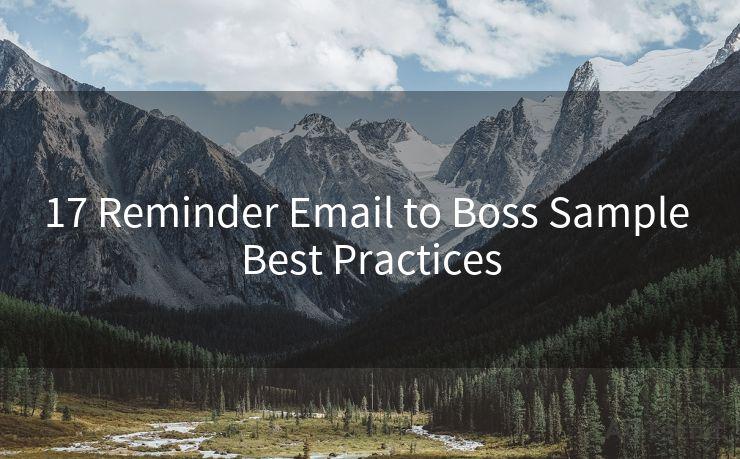17 Reminder Email to Boss Sample Best Practices




In the fast-paced corporate world, communication is key. Often, we need to remind our superiors about certain tasks, meetings, or decisions. Crafting a professional and effective reminder email to your boss can be a delicate task. Here are 17 best practices to help you write a reminder email that gets the message across clearly and respectfully.
1. Clear Subject Line
Start with a clear and concise subject line that summarizes the content of your email. For example, "Reminder: Follow-up on XYZ Project Decision".
2. Formal Greeting
Always begin your email with a formal greeting, such as "Dear [Boss's Name]," to set a professional tone.
3. Direct and Concise Body
Get to the point quickly. State the purpose of your email in the first paragraph. For instance, "I am writing to remind you about the pending decision on the XYZ project."

4. Use Bullet Points
If there are multiple items to remind your boss about, use bullet points for clarity. This makes it easier for the reader to digest the information quickly.
5. Attach Relevant Documents
If there are any documents or links that support your reminder, attach or link them in the email. This provides context and helps your boss recall the details more easily.
6. Polite and Respectful Tone
Maintain a polite and respectful tone throughout your email. Avoid sounding demanding or impatient, even if you're chasing a tight deadline.
7. Call to Action
End your email with a clear call to action. For example, "Could you please review the attached documents and provide your feedback by [specific date]?"
8. Proofread and Edit
Before sending, proofread your email carefully to ensure there are no grammatical or spelling errors. Use a tool like Grammarly or have a trusted colleague review it.
9. Follow Up Appropriately
If you don't receive a response within a reasonable timeframe, consider sending a follow-up email. Keep it brief and polite, simply asking if they've had a chance to review your previous email.
10. Avoid CC'ing Unnecessary Parties
Unless absolutely necessary, avoid CC'ing multiple people on your reminder email. This can be seen as pressure tactics and may backfire.
11. Timing Is Key
Send your reminder at a time when your boss is likely to be checking emails, such as early morning or late afternoon, to increase the chances of a timely response.
12. Personalize Your Email
Tailor your email to your boss's preferences and communication style. If they prefer a more casual tone, adapt your writing style accordingly, while maintaining professionalism.
🔔🔔🔔
【AOTsend Email API】:AOTsend is a Managed Email Service for sending transactional emails. Support Email Types: reminders, authentication, confirmations, notifications, verification codes, invoices, password resets, account activations, billing statements, two-factor authentication (2FA), and one-time passwords (OTP) emails, etc. $0.28 per 1000 Emails. 99% Delivery, 98% Inbox Rate.
You might be interested in:
Why did we start the AOTsend project, Brand Story?
What is a Managed Email API, How it Works?
Best 25+ Email Marketing Platforms (Authority,Keywords&Traffic Comparison)
Best 24+ Email Marketing Service (Price, Pros&Cons Comparison)
Email APIs vs SMTP: How they Works, Any Difference?
13. Use Templates Wisely
While templates can save time, avoid using them verbatim. Personalize the template to fit your specific situation and needs.
14. Double-Check Recipients
Ensure you're sending the email to the correct recipient. Accidentally sending a reminder to the wrong person can be embarrassing and unprofessional.
15. Keep It Short and Sweet
Remember, your boss is busy. Get to the point quickly and efficiently.
16. Close Professionally
End your email with a professional closing, such as "Sincerely," or "Best regards," followed by your name.
17. Follow Company Guidelines
Always adhere to your company's email communication guidelines, if any, to ensure compliance and professionalism.
In conclusion, writing a reminder email to your boss requires a delicate balance of professionalism, clarity, and respect. By following these best practices, you can effectively communicate your message while maintaining a positive working relationship with your superior. Remember, the key is to be clear, concise, and respectful in your communication.




Scan the QR code to access on your mobile device.
Copyright notice: This article is published by AotSend. Reproduction requires attribution.
Article Link:https://www.mailwot.com/p6032.html



